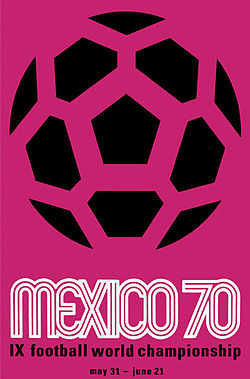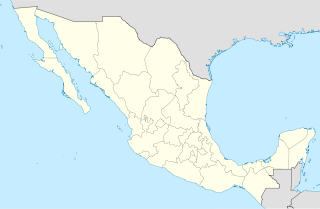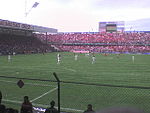- 1970 FIFA World Cup
-
1970 FIFA World Cup Mexico 70 
1970 FIFA World Cup official logoTournament details Host country  Mexico
MexicoDates 31 May – 21 June Teams 16 (from 5 confederations) Venue(s) 5 (in 5 host cities) Final positions Champions  Brazil (3rd title)
Brazil (3rd title)Runners-up  Italy
ItalyThird place  West Germany
West GermanyFourth place  Uruguay
UruguayTournament statistics Matches played 32 Goals scored 95 (2.97 per match) Attendance 1,603,975 (50,124 per match) Top scorer(s)  Gerd Müller (10 goals)← 19661974 →
Gerd Müller (10 goals)← 19661974 →The 1970 FIFA World Cup, the ninth staging of the World Cup, was held in Mexico, from 31 May to 21 June. The 1970 tournament was the first World Cup hosted in North America, and the first held outside South America and Europe. In a match-up of two-time World Cup champions, the final was won by Brazil, who beat Italy 4–1. With their third World Cup triumph, Brazil were allowed to keep the Jules Rimet Trophy permanently.
The Brazilian team, featuring Pelé (who was in his fourth and final World Cup), Carlos Alberto, Clodoaldo, Gérson, Jairzinho, Rivelino, and Tostão, is often regarded as the greatest World Cup team ever.[1][2][3][4][5][6] They won all of their 6 games on the way to the title, and had also won all of their 6 qualifying games on their way to Mexico. This tournament saw the return of free-flowing, attacking play after the physical battles of 1962 and 1966, and is considered by many to be the finest World Cup in history.[7][8]
Contents
Host selection
Main article: FIFA World Cup hostsMexico was chosen as the host nation by FIFA in Tokyo, Japan on 8 October 1964, over opposition from Argentina.
Qualification
Main article: 1970 FIFA World Cup qualificationA total of 75 teams entered the qualifying tournament. Those who failed to qualify included France, Portugal, Hungary, Argentina and Spain. Meanwhile, Morocco became the first African nation to reach the World Cup finals since Egypt in 1934. In addition to Morocco, Israel and El Salvador made their World Cup debuts. As of 2010, this is Israel's only World Cup finals appearance. Peru qualified for the first time, having made one previous appearance in the 1930 tournament (which did not require qualification). Romania qualified for the first time since 1938, and would not qualify again until 1990.
Format
The format of the competition was similar to that of 1966: 16 teams qualified, divided into four groups of four playing each other once in a round-robin tournament format. There were no seeds, instead the organizers formed geographical ‘sections’ from which the four groups were drawn in Mexico City, on 10 January 1970.[9] The top two teams in each group advanced to the quarter-finals. However, for the first time in the World Cup finals, teams level on points at the end of the group stage were separated by goal difference rather than goal average (which had been used in 1962 and 1966). If points and goal difference were both equal, lots would have been drawn. If a quarter-final or semi-final match resulted in a draw after extra time the referee would have drawn the name of the team to progress to the next round out of a hat. The final would have been replayed if drawn after extra time.
Sweden became the first country to be eliminated from a World Cup on goal difference when Uruguay progressed from group 2 in second place.
Summary
First round
The 1970 World Cup is now remembered as a classic – but, as usual, the tournament was preceded by disputes over the organisation of the event. This World Cup was the first one to be televised in colour. However, to fit into the European viewing schedules, some matches kicked off at noon. This was an unpopular decision with many players and managers because of the intense heat in Mexico at that time of day.
 Telstar, the official 1970 FIFA World Cup ball.
Telstar, the official 1970 FIFA World Cup ball.
Controversy surrounded the World Cup before a ball was even kicked. El Salvador qualified for the finals after beating Honduras in a play-off match, which led to the four-day Football War of July 1969.[10] For England, the build-up to the tournament took a bizarre turn when their captain was accused of theft, While the English team was in Colombia for a pre-tournament friendly game. Bobby Moore was arrested for allegedly stealing a bracelet from a jeweller's shop in the Bogotá Bracelet incident. He was released on bail to allow him to appear in the World Cup finals, and the charges were later quietly dropped.
In Group 1, hosts Mexico lived up to the expectations of an entire nation by advancing along with the Soviet Union. This was the first time in seven World Cup tournaments that Mexico had progressed from the initial stage.
Group 2 of the opening round produced just six goals in six games as Uruguay, reigning South America champions, and the reigning European champions, Italy, prevail over Sweden and surprise qualifier Israel after a series of dull, uninspired games. Italy would, however, show the true measure of its talent in the knock-out phase.
Group 3 featured both two-time former World champion Brazil, defending world champions England and solid European sides Czechoslovakia and Romania. In the rematch of the 1962 World Cup final, Brazil fell behind early in their opening game against Czechoslovakia, but fought back strongly and eventually won 4–1. Pelé scored one of their goals, but a goal attempt that in which Pelé audaciously attempted to lob a shot over Czechoslovak goalkeeper Ivo Viktor from the halfway line, missed the goal by a whisker. The "Clash of the Champions" between Brazil and England lived up to all expectations. The match is best remembered for a Pelé near-miss. His powerful close-range downward header was kept out by an amazing save from Gordon Banks, who somehow managed to get down to the ball and flick it upwards and over the bar. In the end, a single Jairzinho goal was enough to win the game for Brazil. Romania ran Brazil close in their third game, but were finally beaten 3–2. England joined Brazil with two 1–0 victories over Romania and Czechoslovakia.
In Group 4, Peru and its attacking style created a sensation by beating established side Bulgaria 3–2 after trailing 0–2 at halftime. Morocco also got off to a bright start, taking the lead against West Germany in their first match, but the Germans came back to win 2–1. West Germany also went behind against Bulgaria in their second match, but a Gerd Muller hat-trick helped them fight back to win 5–2. Muller hit another hat-trick in the Germans' last group game, scoring all their goals in a 3–1 win over Peru. In the end, Peru eventually advanced along with West Germany after scoring three times in 11 second-half minutes to beat Morocco 3–0.
Quarter-finals
The quarter-finals saw a transformed Italy prevail 4–1 over Mexico after trailing 0–1. The host took the lead against Italy with a Jose Gonzales goal, but his team-mate Gustavo Pena equalised with an own goal before half-time. Italy then took over, and dominated the second half. Two goals from Luigi Riva and one from Gianni Rivera saw them go through 4–1. In Guadalajara, Peru's World Cup adventure ended in the quarter-finals, where they lost 4–2 to Brazil after an entertaining and dramatic match between two equally attacking teams.
The game between Uruguay and the Soviet Union was goalless until five minutes from the end of extra time, when Victor Esparrago struck to send the South Americans through. The last quarter-final, a rematch of the 1966 World Cup final between England and West Germany, produced one of the great matches of World Cup history. England suffered a serious blow before the game, when their great goalkeeper Gordon Banks was taken ill with food poisoning. His deputy Peter Bonetti stepped into the breach, and early in the second half England had a 2–0 lead and seemed to have West Germany firmly in its grasp. However, West Germany pulled one back with a goal from Beckenbauer in the 68th minute. In a panic, England coach Alf Ramsey decided then to substitute the tiring Bobby Charlton. Without Charlton, England lost its ability to set its own pace on the game and could not contain the relentless German attacks which eventually resulted in West Germany equalizing eight minutes from time with an Uwe Seeler header. In extra-time, Geoff Hurst had a goal mysteriously ruled out[11] before Gerd Müller's winning goal in extra time after another Bonetti error, thus, ending England's reign as world champions.
Semifinals, third place
The semi-finals featured an exciting final four, all four having won the World Cup in the past: Brazil vs Uruguay, and Italy vs West Germany. In the all-South American match, Brazil managed to defeat Uruguay 3–1, finally gaining revenge for their defeat in the deciding match of the 1950 World Cup. Brazil fell behind 20 minutes into the match. The game was evenly matched for 70 minutes but the Uruguayans found Brazil's attack too much to overcome. This match also featured another bright moment by Pelé: upon holding possession near the box, he managed to rush all alone up to Uruguayan goalkeeper Ladislao Mazurkiewicz and, tipping the ball through his left side, the Brazilian ran through the right side, catching the ball on the run and then taking a shot to the empty goal. However, Pelé missed by a sliver again. The other, all-European semi-final was regarded by many as the greatest World Cup game ever. Italy took a 1–0 lead through Roberto Boninsegna on 8 minutes after an excellent "one-two" combination with Luigi Riva. West Germany pressed to equalize for the rest of the game, until the very end when sweeper Karl-Heinz Schnellinger, then with Italy's AC Milan, scored in injury time. In extra time, Gerd Müller brought Germany the lead on 94 minutes before Italy defender Tarcisio Burgnich leveled the score with a rare international goal. On 103 minutes, Riva made it 3–2 past goalkeeper Sepp Maier, only for Müller to equalize six minutes later. As television cameras were still replaying Müller's goal, Italy midfielder Gianni Rivera, left unmarked near the penalty spot, volleyed a fine Boninsegna cross past Maier for the winning goal in the 111th minute. Franz Beckenbauer sustained a broken clavicle during extra time. As Helmut Schön, the West German manager, had already used the two permitted substitutes, Beckenbauer stayed on with his arm in a sling. This match is regarded as the "Game of the Century", also known as the Partita del Secolo in Italy and Jahrhundertspiel in Germany. A monument at the Estadio Azteca in Mexico City commemorates it. West Germany went on to win the 3rd place match against Uruguay (1–0).
Final
In the final, Brazil struck first, with Pelé heading in a cross by Rivelino after a throw-in at the 18th minute. Roberto Boninsegna equalized for Italy after a series of blunders in the Brazilian defence. In the second half, Brazil's firepower and creativity was too much for a tired Italian side. Gérson fired in a powerful shot for the second goal, leaving Enrico Albertosi, the Italian keeper helpless, leaving and then helped provide the third, with a long free kick to Pelé who headed down into the path of the onrushing Jairzinho. Brazil's fourth goal, with five minutes to go, is considered one of the greatest goals ever scored in the history of the tournament. A total of 8 outfield players from Brazil were involved, encapsulating 'the beautiful game' in one glorious sweeping move. Tostão started the move just outside the Brazilian 18 yard box, then ran the length of the field to the Italian box without touching the ball again (although he signalled for Pelé to lay it off for Carlos Alberto). Clodoaldo beat 4 Italian players in his own half before passing to Rivelino, who hit a perfect pass down the left wing to Jairzinho. Jairzinho drove inside and passed to Pelé, who showed superb composure, in his last moments of World Cup play, to hold the ball up before rolling a perfectly weighted pass into the path of Carlos Alberto arriving from right back. Carlos Alberto's shot hammered into the bottom corner of the Italian goal, going too quick for Enrico Albertosi to even touch it.
Brazil had won the World Cup for the third time after 1958 and 1962, earning the right to retain the Jules Rimet Trophy permanently. In Pelé, Brazil had a player who had won World Cups 12 years apart, yet still remained at the heart of everything Brazil did, providing the game's most sublime moments ranging from his hanging leap for Brazil's opener and his chess-player's pass for the final goal. Even Pelé's misses will go down in history: the 'own-half' attempt against Czechoslovakia, the 'unstoppable' header against England and most memorably of all the dummy against Uruguay in the semi-final. Seven players (all of whom featured in the Carlos Alberto goal) scored a total of 19 goals (more than any team since). Jairzinho scored in every match in the finals, an amazing feat. While Tostão proved a quick-witted and skilful strike partner. Clodoaldo and particularly Gerson provided superb passes to the front three, as well as goals at critical moments, and Rivelino's left-footed crosses and long-distance shooting were a constant danger. Coach Mário Zagallo was the first footballer to become World Cup champion as a player (1958, 1962) and a coach - his other attempts (1974, 1998) would not be successful.
But it was the style of play that will be remembered. Italy's goal in the final involved four separate errors by the Brazilian defence, but it was of no matter; in 1970 defence was not Brazil's primary interest, with their 7 goals conceded being more than any other champion since. They gambled on outscoring the opposition, and won, every time. Since 1970 winning the World Cup has not been possible without a cast-iron defence, as evidenced by the failure of another great attacking side, Brazil's 1982 team. It would be 24 years before Brazil could put their hands on the new FIFA trophy, once again beating Italy in the final of the 1994 World Cup, although only on penalties and needing a much more defensive style to that seen in 1970.
Before the finals in Mexico, Brazil had to play the qualifying rounds against Colombia, Venezuela and Paraguay. Brazil was far superior winning all 6 games, scoring 23 goals and conceding only 2. In the last match of the qualifying rounds Brazil beat Paraguay 1 – 0 and had the largest official audience ever recorded for a football match, with 183,341 spectators in Brazil's Maracanã Stadium. In total the Brazilian team won all 12 games , scoring 42 goals and conceding only 8. At the Finals Brazil defeated three former World Cup winners: England, Uruguay and Italy. Brazil was the first team to achieve this feat, subsequently matched only by Italy in 1982 and Argentina in 1986.
The top scorer of the tournament was West Germany's Gerd Müller, with an impressive 10 goals in the competition. Müller incredibly scored hat-tricks in two consecutive games, against Bulgaria and Peru in the group stage.
Mascot
The official mascot of this World Cup was Juanito, a boy wearing Mexico's uniform and a sombrero.
Venues
Five cities hosted the tournament:
Guadalajara León Mexico City Puebla Toluca Estadio Jalisco Estadio Nou Camp Estadio Azteca Estadio Cuauhtémoc Estadio Luis Dosal 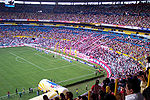
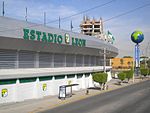
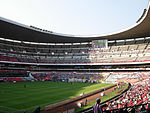
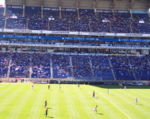
Match officials
- AFC
- CAF
- CONCACAF
- CONMEBOL
 Ángel Norberto Coerezza
Ángel Norberto Coerezza Antônio de Moraês
Antônio de Moraês Rafael Hormázabal
Rafael Hormázabal Arturo Yamasaki
Arturo Yamasaki Ramón Barreto
Ramón Barreto
- UEFA
 Ferdinand Marschall
Ferdinand Marschall Vital Loraux
Vital Loraux Rudi Glöckner
Rudi Glöckner Jack Taylor
Jack Taylor
 Roger Machin
Roger Machin Antonio Sbardella
Antonio Sbardella Laurens van Ravens
Laurens van Ravens Antonio Ribeiro Saldanha
Antonio Ribeiro Saldanha Andrei Rǎdulescu
Andrei Rǎdulescu Bob Davidson
Bob Davidson Ortíz de Mendibil
Ortíz de Mendibil Tofik Bakhramov
Tofik Bakhramov Rudolf Scheurer
Rudolf Scheurer Kurt Tschenscher
Kurt Tschenscher
Squads
For a list of all squads that appeared in the final tournament, see 1970 FIFA World Cup squads.
Results
Group stage
Group 1
Team Pld W D L GF GA GD Pts  Soviet Union
Soviet Union3 2 1 0 6 1 +5 5  Mexico
Mexico3 2 1 0 5 0 +5 5  Belgium
Belgium3 1 0 2 4 5 −1 2  El Salvador
El Salvador3 0 0 3 0 9 −9 0 31 May 1970
12:00 (CST)Mexico 
0 – 0  Soviet Union
Soviet UnionEstadio Azteca, Mexico City
Attendance: 107,000
Referee: Kurt Tschenscher (West Germany)Report
3 June 1970
16:00 (CST)Belgium 
3 – 0  El Salvador
El SalvadorEstadio Azteca, Mexico City
Attendance: 92,000
Referee: Andrei Rădulescu (Romania)Van Moer  12', 54'
12', 54'
Lambert 76' (pen.)
76' (pen.)Report
6 June 1970
16:00 (CST)Soviet Union 
4 – 1  Belgium
BelgiumEstadio Azteca, Mexico City
Attendance: 59,000
Referee: Rudolf Scheurer (Switzerland)Byshovets  14', 63'
14', 63'
Asatiani 57'
57'
Khmelnitsky 76'
76'Report Lambert  86'
86'
7 June 1970
12:00 (CST)Mexico 
4 – 0  El Salvador
El SalvadorEstadio Azteca, Mexico City
Attendance: 103,000
Referee: Ali Kandil (United Arab Republic)Valdivia  45', 46'
45', 46'
Fragoso 58'
58'
Basaguren 83'
83'Report
10 June 1970
16:00 (CST)Soviet Union 
2 – 0  El Salvador
El SalvadorEstadio Azteca, Mexico City
Attendance: 89,000
Referee: Rafael Hormazábal Díaz (Chile)Byshovets  51', 74'
51', 74'Report
11 June 1970
16:00 (CST)Mexico 
1 – 0  Belgium
BelgiumEstadio Azteca, Mexico City
Attendance: 105,000
Referee: Angel Norberto Coerezza (Argentina)Peña  14' (pen.)
14' (pen.)Report Group 2
Team Pld W D L GF GA GD Pts  Italy
Italy3 1 2 0 1 0 +1 4  Uruguay
Uruguay3 1 1 1 2 1 +1 3  Sweden
Sweden3 1 1 1 2 2 0 3  Israel
Israel3 0 2 1 1 3 −2 2 2 June 1970
16:00 (CST)Uruguay 
2 – 0  Israel
IsraelEstadio Cuauhtémoc, Puebla
Attendance: 20,000
Referee: Bob Davidson (Scotland)Maneiro  23'
23'
Mujica 52'
52'Report
3 June 1970
16:00 (CST)Italy 
1 – 0  Sweden
SwedenEstadio Luis Dosal, Toluca
Attendance: 14,000
Referee: Jack Taylor (England)Domenghini  10'
10'Report
6 June 1970
16:00 (CST)Uruguay 
0 – 0  Italy
ItalyEstadio Cuauhtémoc, Puebla
Attendance: 30,000
Referee: Rudi Glöckner (East Germany)Report
7 June 1970
12:00 (CST)Israel 
1 – 1  Sweden
SwedenEstadio Luis Dosal, Toluca
Attendance: 10,000
Referee: Seyoum Tarekegn (Ethiopia)Spiegler  56'
56'Report Turesson  53'
53'
10 June 1970
16:00 (CST)Sweden 
1 – 0  Uruguay
UruguayEstadio Cuauhtémoc, Puebla
Attendance: 18,000
Referee: Henry Landauer (United States)Grahn  90'
90'Report
11 June 1970
16:00 (CST)Italy 
0 – 0  Israel
IsraelEstadio Luis Dosal, Toluca
Attendance: 10,000
Referee: Antonio De Moraes (Brazil)Report Group 3
Team Pld W D L GF GA GD Pts  Brazil
Brazil3 3 0 0 8 3 +5 6  England
England3 2 0 1 2 1 +1 4  Romania
Romania3 1 0 2 4 5 −1 2  Czechoslovakia
Czechoslovakia3 0 0 3 2 7 −5 0 2 June 1970
16:00 (CST)England 
1 – 0  Romania
RomaniaEstadio Jalisco, Guadalajara
Attendance: 50,560
Referee: Vital Loraux (Belgium)Hurst  65'
65'Report
3 June 1970
16:00 (CST)Brazil 
4 – 1  Czechoslovakia
CzechoslovakiaEstadio Jalisco, Guadalajara
Attendance: 52,897
Referee: Ramón Barreto (Uruguay)Rivelino  24'
24'
Pelé 59'
59'
Jairzinho 61', 81'
61', 81'Report Petráš  11'
11'
6 June 1970
16:00 (CST)Romania 
2 – 1  Czechoslovakia
CzechoslovakiaEstadio Jalisco, Guadalajara
Attendance: 56,818
Referee: Diego De Leo (Mexico)Neagu  52'
52'
Dumitrache 75' (pen.)
75' (pen.)Report Petráš  5'
5'
7 June 1970
12:00 (CST)Brazil 
1 – 0  England
EnglandEstadio Jalisco, Guadalajara
Attendance: 66,834
Referee: Abraham Klein (Israel)Jairzinho  59'
59'Report
10 June 1970
16:00 (CST)Brazil 
3 – 2  Romania
RomaniaEstadio Jalisco, Guadalajara
Attendance: 50,804
Referee: Ferdinand Marschall (Austria)Pelé  19', 67'
19', 67'
Jairzinho 22'
22'Report Dumitrache  34'
34'
Dembrovschi 84'
84'
11 June 1970
16:00 (CST)England 
1 – 0  Czechoslovakia
CzechoslovakiaEstadio Jalisco, Guadalajara
Attendance: 49,262
Referee: Roger Machin (France)Clarke  50' (pen.)
50' (pen.)Report Group 4
Team Pld W D L GF GA GD Pts  West Germany
West Germany3 3 0 0 10 4 +6 6  Peru
Peru3 2 0 1 7 5 +2 4  Bulgaria
Bulgaria3 0 1 2 5 9 −4 1  Morocco
Morocco3 0 1 2 2 6 −4 1 2 June 1970
16:00 (CST)Peru 
3 – 2  Bulgaria
BulgariaEstadio Nou Camp, León
Attendance: 13,765
Referee: Antonio Sbardella (Italy)Gallardo  50'
50'
Chumpitaz 55'
55'
Cubillas 73'
73'Report Dermendzhiev  13'
13'
Bonev 49'
49'
3 June 1970
16:00 (CST)West Germany 
2 – 1  Morocco
MoroccoEstadio Nou Camp, León
Attendance: 12,942
Referee: Laurens van Ravens (Netherlands)Seeler  56'
56'
Müller 78'
78'Report Houmane  21'
21'
6 June 1970
16:00 (CST)Peru 
3 – 0  Morocco
MoroccoEstadio Nou Camp, León
Attendance: 13,537
Referee: Tofik Bakhramov (Soviet Union)Cubillas  65', 75'
65', 75'
Challe 67'
67'Report
7 June 1970
12:00 (CST)West Germany 
5 – 2  Bulgaria
BulgariaEstadio Nou Camp, León
Attendance: 12,710
Referee: José María Ortiz de Mendibil (Spain)Libuda  20'
20'
Müller 27', 52' (pen.), 88'
27', 52' (pen.), 88'
Seeler 67'
67'Report Nikodimov  12'
12'
Kolev 89'
89'
10 June 1970
16:00 (CST)West Germany 
3 – 1  Peru
PeruEstadio Nou Camp, León
Attendance: 17,875
Referee: Abel Aguilar Elizalde (Mexico)Müller  19', 26', 39'
19', 26', 39'Report Cubillas  44'
44'
11 June 1970
16:00 (CST)Morocco 
1 – 1  Bulgaria
BulgariaEstadio Nou Camp, León
Attendance: 12,299
Referee: Antonio Ribeiro Saldanha (Portugal)Ghazouani  61'
61'Report Zhechev  40'
40'Knockout stage
Quarter-finals Semi-finals Final 14 June – Mexico City  Soviet Union
Soviet Union0 17 June – Guadalajara  Uruguay (a.e.t.)
Uruguay (a.e.t.)1  Uruguay
Uruguay1 14 June – Guadalajara  Brazil
Brazil3  Brazil
Brazil4 21 June – Mexico City  Peru
Peru2  Brazil
Brazil4 14 June – Toluca  Italy
Italy1  Italy
Italy4 17 June – Mexico City  Mexico
Mexico1  Italy (a.e.t.)
Italy (a.e.t.)4 Third place 14 June – León  West Germany
West Germany3  West Germany (a.e.t.)
West Germany (a.e.t.)3  Uruguay
Uruguay0  England
England2  West Germany
West Germany1 20 June – Mexico City Quarter-finals
14 June 1970
12:00 (CST)West Germany 
3 – 2 (a.e.t.)  England
EnglandEstadio Nou Camp, León
Attendance: 23,357
Referee: Ángel Norberto Coerezza (Argentina)Beckenbauer  68'
68'
Seeler 76'
76'
Müller 108'
108'Report Mullery  31'
31'
Peters 49'
49'
14 June 1970
12:00 (CST)Brazil 
4 – 2  Peru
PeruEstadio Jalisco, Guadalajara
Attendance: 54,270
Referee: Vital Loraux (Belgium)Rivelino  11'
11'
Tostão 15', 52'
15', 52'
Jairzinho 75'
75'Report Gallardo  28'
28'
Cubillas 70'
70'
14 June 1970
12:00 (CST)Italy 
4 – 1  Mexico
MexicoEstadio Luis Dosal, Toluca
Attendance: 26,851
Referee: Rudolf Scheurer (Switzerland)Guzmán  25' (o.g.)
25' (o.g.)
Riva 63', 76'
63', 76'
Rivera 70'
70'Report González  13'
13'
14 June 1970
12:00 (CST)Uruguay 
1 – 0 (a.e.t.)  Soviet Union
Soviet UnionEstadio Azteca, Mexico City
Attendance: 24,550
Referee: Laurens van Ravens (Netherlands)Espárrago  116'
116'Report Semi-finals
17 June 1970
16:00 (CST)Brazil 
3 – 1  Uruguay
UruguayEstadio Jalisco, Guadalajara
Attendance: 51,261
Referee: José María Ortiz de Mendibil (Spain)Clodoaldo  44'
44'
Jairzinho 76'
76'
Rivelino 89'
89'Report Cubilla  19'
19'
Main article: Italy 4–3 West Germany (1970)17 June 1970
16:00 (CST)Italy 
4 – 3 (a.e.t.)  West Germany
West GermanyEstadio Azteca, Mexico City
Attendance: 102,444
Referee: Arturo Yamasaki Maldonado (Mexico) [12]Boninsegna  8'
8'
Burgnich 98'
98'
Riva 104'
104'
Rivera 111'
111'Report Schnellinger  90'
90'
Müller 94', 110'
94', 110'Match for third place
20 June 1970
16:00 (CST)West Germany 
1 – 0  Uruguay
UruguayEstadio Azteca, Mexico City
Attendance: 104,403
Referee: Antonio Sbardella (Italy)Overath  26'
26'Report Final
Main article: 1970 FIFA World Cup Final21 June 1970
12:00 (CST)Brazil 
4 – 1  Italy
ItalyEstadio Azteca, Mexico City
Attendance: 107,412
Referee: Rudi Glöckner (East Germany)Pelé  18'
18'
Gérson 66'
66'
Jairzinho 71'
71'
Carlos Alberto 86'
86'Report Boninsegna  37'
37'Awards
FIFA Fair Play Trophy  Peru
PeruScorers
- 10 goals
- 7 goals
- 5 goals
- 4 goals
- 3 goals
- 2 goals
- 1 goal
 Maouhoub Ghazouani
Maouhoub Ghazouani Mohammed Houmane
Mohammed Houmane Juan Ignacio Basaguren
Juan Ignacio Basaguren Javier Fragoso
Javier Fragoso José Luis González
José Luis González Gustavo Peña
Gustavo Peña Roberto Challe
Roberto Challe Héctor Chumpitaz
Héctor Chumpitaz Emerich Dembrovschi
Emerich Dembrovschi Alexandru Neagu
Alexandru Neagu Kakhi Asatiani
Kakhi Asatiani Vitaly Khmelnitsky
Vitaly Khmelnitsky Ove Grahn
Ove Grahn Tom Turesson
Tom Turesson Luis Cubilla
Luis Cubilla Víctor Espárrago
Víctor Espárrago Ildo Maneiro
Ildo Maneiro Juan Mujica
Juan Mujica
- Own goals
 Gustavo Peña (for Italy)
Gustavo Peña (for Italy)
FIFA Retrospective Ranking
In 1986, FIFA published a report that ranked all teams in each World Cup up to and including 1986, based on progress in the competition, overall results and quality of the opposition.[13] The rankings for the 1970 tournament were as follows:
Final
3rd and 4th place
Eliminated in the quarter-finals
Eliminated at the group stage
 Sweden
Sweden Belgium,
Belgium,  Romania (same rank)
Romania (same rank) Bulgaria
Bulgaria Israel
Israel Morocco
Morocco Czechoslovakia
Czechoslovakia El Salvador
El Salvador
Notable innovations
For the first time, substitutions were allowed in World Cup play. Each team were allowed to make two substitutions during a match. The Soviet Union were the first team to make a substitution in World Cup history against Mexico in the opening match. Viktor Serebryanikov was the first player to be replaced, by Anatoliy Puzach after 45 minutes.
This World Cup also featured the first ever use of yellow and red cards for cautions and expulsions respectively. (Note that cautions and expulsions already existed prior to 1970.) Five yellow cards were shown in the opening Mexico vs USSR match, while no red cards were given in the tournament. These were thought of when the coach attempted to warn off an offending player in the previous World Cup.[clarification needed]
References
- ^ Brazil 'best ever' says Five Live BBC Sport. Retrieved May 5 2011
- ^ The boys from Brazil: On the trail of football's dream team The Independent. Retrieved May 14, 2011
- ^ Mexico 1970: Brazilians show all how beautiful game should be played Sky Sports Retrieved May 5, 2011
- ^ 1970 Brazilian Soccer Team Voted Best Ever The New York Times. Retrieved May 5 2011
- ^ The greatest teams of all time The Telegraph. Retrieved May 5 2011
- ^ The 10 greatest football teams of all time Daily Mail. Retrieved May 5, 2011
- ^ The 100 greatest World Cup moments: (No.1) .The Independent. Retrieved 13 May 2011
- ^ Why Mexico 1970 was the greatest World Cup ever The Mirror. Retrieved May 14, 2011
- ^ History of the World Cup Final Draw
- ^ Anderson, Thomas P. The War of the Dispossessed: Honduras and El Salvador 1969. p.105 Lincoln: University of Nebraska Press, 1981.
- ^ England: The Official F.A History, Niall Edworthy, Virgin Publishers, 1997, ISBN 1-85227-699-1. p. 101
- ^ Arturo Yamasaki was born in Peru, where he begun his career as referee. He moved from Peru to officiate matches in Mexico in 1968, and hence he attended this World Cup as a representative of the Mexican football federation.
- ^ Permanent Table: FIFA World Cup. 'FIFA.com page 45. Rerieved May 5 2011
External links
- FIFA report on the 1970 World Cup Finals
- Details at RSSSF
- History of the World Cup-1970
- Planet World Cup - Mexico 1970
- Brazil's heroes of 1970 relive their days of glory
1970 FIFA World Cup Stages General information 1970 FIFA World Cup finalists Champions Runners-up Third place Fourth place Eliminated in the quarter-finals Eliminated in the group stage FIFA World Cup Tournaments - Uruguay 1930
- Italy 1934
- France 1938
- Brazil 1950
- Switzerland 1954
- Sweden 1958
- Chile 1962
- England 1966
- Mexico 1970
- West Germany 1974
- Argentina 1978
- Spain 1982
- Mexico 1986
- Italy 1990
- United States 1994
- France 1998
- South Korea & Japan 2002
- Germany 2006
- South Africa 2010
- Brazil 2014
- Russia 2018
- Qatar 2022
Finals Squads Qualification Other articles - Awards
- Balls
- Broadcasters
- Droughts
- Finals
- Goalscorers
- Hat-tricks
- History
- Hosts
- Mascots
- Milestone goals
- Official songs
- Penalty shoot-outs
- Qualification
- Records
- Red cards
- Referees
- Team appearances
- Trophy
- Video games
1Decisive match of a final group stage. 2No qualification took place as places were given by invitation only.International association football FIFA · World Cup · Confederations Cup · U-20 World Cup · U-17 World Cup · Olympics · Minor tournaments · World Rankings · Player of the Year · FIFA Ballon d'Or · Teams · Debuts · Competitions · Federations · CodesAsia 
Africa North,
Central America
and CaribbeanSouth America Oceania Europe Non-FIFA Games All-Africa Games · Asian Games · CARIFTA Games · East Asian Games · Francophonie Games · IOIG · Lusophony Games · Mediterranean Games · Pan American Games · Pan Arab Games · Pacific Games · South Asian Games · Southeast Asian GamesSee also International women's football.Categories:- 1970 FIFA World Cup
- FIFA World Cup tournaments
- 1970 in Mexico
- International football (soccer) competitions hosted by Mexico
Wikimedia Foundation. 2010.


